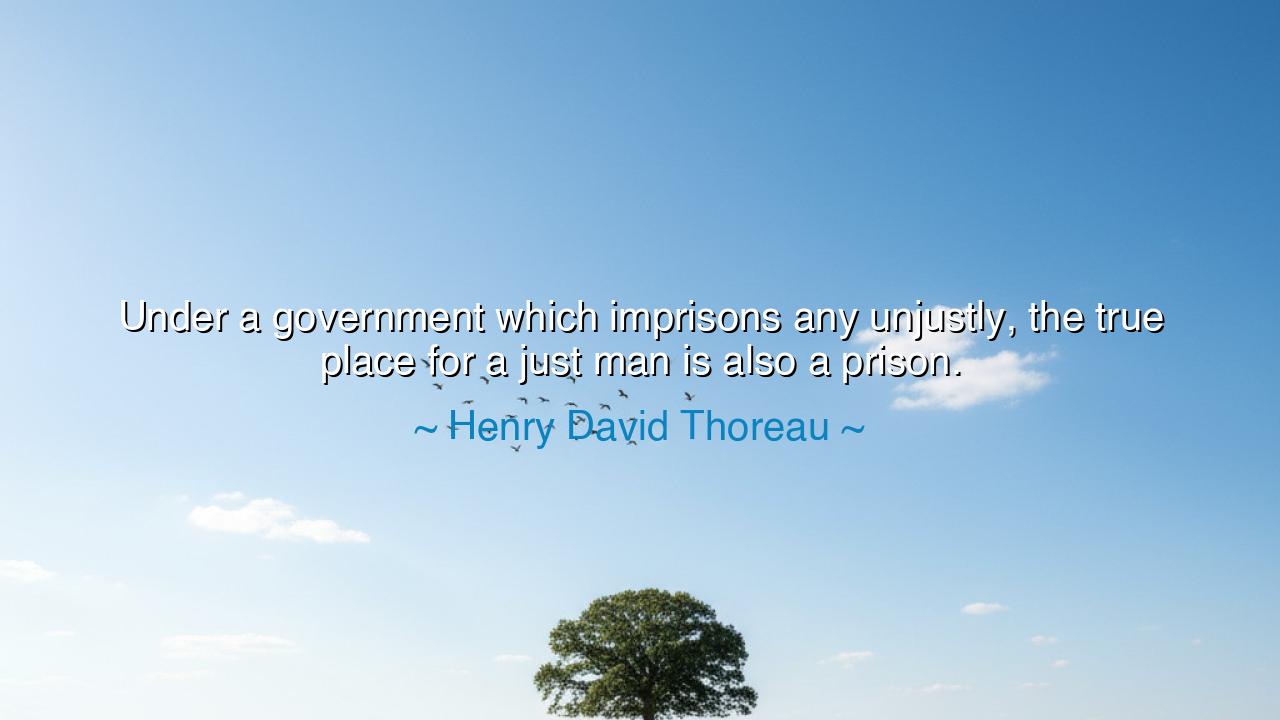
Under a government which imprisons any unjustly, the true place
Under a government which imprisons any unjustly, the true place for a just man is also a prison.






"Under a government which imprisons any unjustly, the true place for a just man is also a prison." – Henry David Thoreau
When Henry David Thoreau wrote these immortal words, he was not merely rebelling against the injustices of his own age—he was setting forth a universal commandment for all times. To him, justice was not obedience to law, but obedience to conscience. In this statement, Thoreau declared that when a government becomes corrupt, when it violates the sacred rights of the innocent, the moral man must not stand beside it, but against it. And if the price of resistance is imprisonment, then so be it—for the cell of the righteous is holier than the throne of the tyrant.
The origin of this quote lies in Thoreau’s essay Civil Disobedience (1849), written after he was jailed in 1846 for refusing to pay a poll tax that funded the Mexican-American War—a war he believed to be unjust and rooted in the expansion of slavery. For one night, Thoreau sat in a Concord jail, not as a criminal, but as a free man surrounded by the walls of tyranny. That experience transformed his view of moral duty. He realized that when government ceases to act justly, the moral man must withdraw his cooperation, even if that means bearing the punishment of law. To Thoreau, prison was not shameful—it was the sanctuary of integrity.
Thoreau’s words would later echo through the ages, inspiring generations of reformers and revolutionaries. His idea that a just man belongs in prison under an unjust regime became the spiritual foundation of civil disobedience movements around the world. Mahatma Gandhi, reading Thoreau in South Africa, adopted his principles and transformed them into Satyagraha—the “truth-force” that would one day liberate India from British rule. Similarly, Dr. Martin Luther King Jr., writing from his cell in Birmingham Jail, declared that “one has a moral responsibility to disobey unjust laws.” Both men embodied Thoreau’s belief that true justice often demands personal suffering, for righteousness is tested not in comfort, but in chains.
There is a sacred paradox in Thoreau’s declaration. He turns imprisonment—an instrument of control—into a symbol of purity. The state can confine the body, but not the conscience; it can chain the hands, but not the spirit. For when a man is punished for doing what is right, his suffering exposes the corruption of his persecutors. In this sense, the prison becomes a mirror—reflecting the moral decay of the system and the moral strength of the dissenter. Thoreau understood that justice must sometimes stand outside the law, for laws are only good when they serve the higher truth of human dignity.
History offers countless examples that prove the enduring wisdom of Thoreau’s words. Think of Nelson Mandela, who spent twenty-seven years imprisoned for opposing apartheid. The government called him a criminal; the world later called him a saint. His cell became a temple of courage, and his suffering dismantled the moral legitimacy of his oppressors. Or recall Vaclav Havel, the Czech playwright who was jailed for defying totalitarian rule, only to emerge as the first president of a free Czechoslovakia. These men, like Thoreau, discovered that the just man’s chains are the tyrant’s condemnation.
Thoreau’s philosophy is both a warning and a challenge. It warns that any government capable of imprisoning the innocent is no longer legitimate—it has turned from protector to predator. Yet it challenges the individual to take moral responsibility, to refuse participation in evil no matter how small the act or how great the cost. Silence, he insists, is complicity; neutrality, cowardice. The true patriot is not he who obeys his nation blindly, but he who loves it enough to hold it accountable to its ideals.
The lesson, then, is this: Freedom is not maintained by comfort or conformity, but by conscience. The price of justice is often suffering, and the path of integrity is seldom easy. But the man who remains silent in the face of injustice is already a prisoner of fear, while the one who resists, even behind bars, walks in the light of truth.
And so, the practical actions are clear. Examine every law not by its letter, but by its spirit. Ask not, “Is this legal?” but “Is this just?” When power commands what conscience forbids, choose conscience. When the world punishes you for doing right, remember Thoreau’s teaching: that the true place for a just man under an unjust government is the prison, for in that darkness shines the brightest flame of freedom—the courage of one who dares to live by truth.






AAdministratorAdministrator
Welcome, honored guests. Please leave a comment, we will respond soon